Liberation of mind
- God does nothing 心の不思議な力
心の解放 / Liberation of mind
箱の中の蚤の話
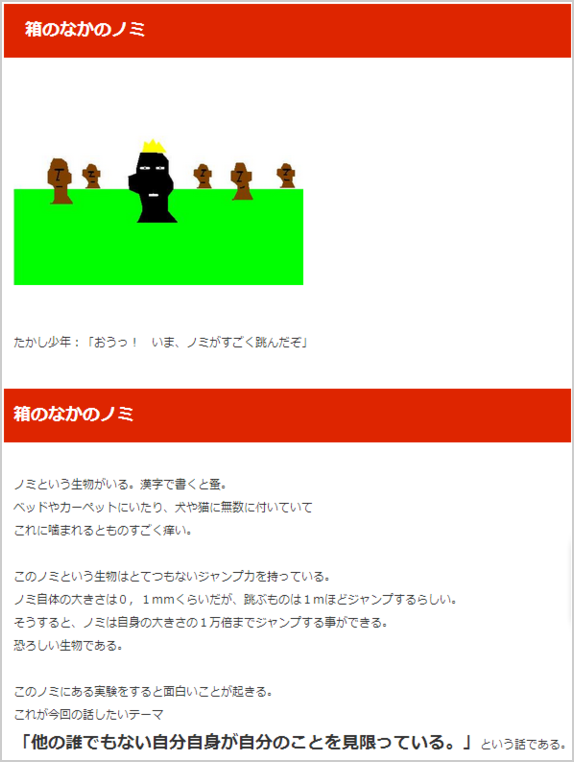
http://moapri.com/nomi.html
ノミを訓練する方法!
How to Train Fleas!
博士道夫カク:学校での学習システムに問題。
Dr. Michio Kaku: The Problem with the learning system in school.
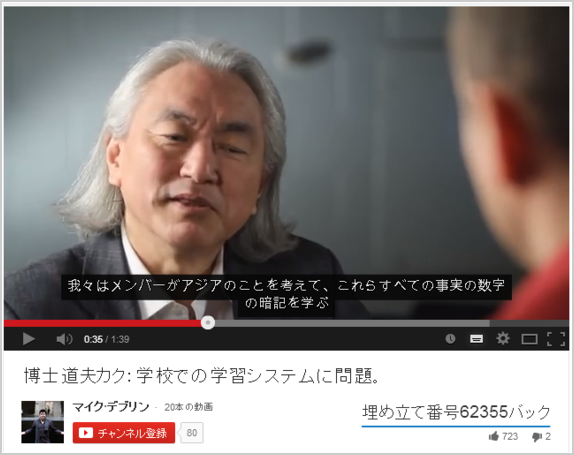
2010/03/31 にアップロード
(小サンプル部分のインタビューから)クライアント:組み込みシステムデザイン会議:目標は、科学チャネルで定期的に見ることができます偉大な物理学者、博士郭とのインタビューを撮影することでした。ビデオ全体は、まもなくオンライン提供されます。
(Small Sample portion from interview) Client: Embedded System Design Conference: Goal was to film an interview with the great physicist, Dr. Kaku, who can be seen regularly on the science channel.The entire video will be made available online shortly.
---------------------------------------------------
道夫カク すべての子供が天才に生まれていますが、社会自体によって潰される
Michio Kaku All kids are born geniuses, but are crushed by society itself
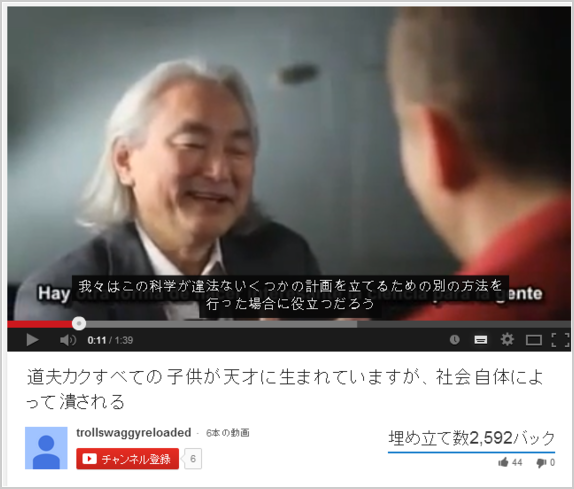
なぜ我々は宗教詐欺のドグマ(教義)を拒否し、私たち自身の真実を見つける必要があります
Why We Must Reject the Dogma of Religious Frauds and Find Our Own Truth
Liberation of the Mind and Rejection of Religious Dogma
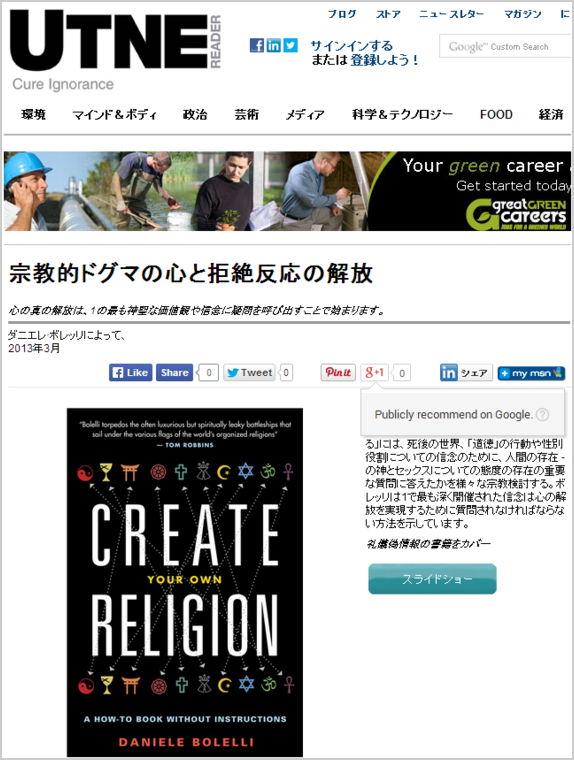
著作権2014、すべての権利を保有|オグデン出版社、1503 SW第42回セント、トピーカ、カンザス州66609から1265
Copyright 2014, All Rights Reserved | Ogden Publications, Inc., 1503 SW 42nd St., Topeka, Kansas 66609-1265
心の真の解放は、1の最も神聖な価値観や信念に疑問を呼び出すことで始まります。
True liberation of the mind begins with calling into question one’s most sacred values and beliefs.
ダニエレ·ボレッリによって、2013年3月
By Daniele Bolelli March 2013
著者ダニエルボレッリ「独自の宗教を作成する」には、死後の世界、「道徳」の行動や性別役割についての信念のために、人間の存在 - の神とセックスについての態度の存在の重要な質問に答えたかを様々な宗教検討する。ボレッリは1で最も深く開催された信念は心の解放を実現するために質問されなければならない方法を示しています。
In “Create Your Own Religion” author Daniele Bolelli examines how different religions have answered the key questions of human existence—from the existence of God and attitudes about sex, to beliefs about the afterlife, “moral” behavior and gender roles. Bolelli shows how one’s most deeply held beliefs must be questioned in order to achieve liberation of the mind.
礼儀偽情報の書籍をカバー
Cover Courtesy Disinfo Books
あなた自身の宗教を作成します (偽情報の書籍、2013) 、腕への呼び出しすべての価値観、信念に疑問を公募であり、人類がこれまでのところ、我々は非常に実用的な問題に必要な答えを見つけるために神聖として保有していることを世界観私たちが直面する。
Create Your Own Religion (Disinfo Books, 2013) is a call to arms—an open invitation to question all the values, beliefs, and worldviews that humanity has so far held as sacred in order to find the answers we need to the very practical problems facing us.
作家、哲学者、および比較宗教学の教授、ダニエルボレッリ、神話、女嫌い、誤報、平和な人生を送るために我々の能力を何とかしていき、「真実を明らかにした」程度のフラットアウト嘘の3000年を通して読者を導く罪悪感と恥と死の究極の恐怖の自由。次の抜粋は、第2章から来て、「腕への呼びかけ:続編。 " 」
Writer, philosopher, and professor of comparative religion, Daniele Bolelli, leads the reader through three thousand years of mythology, misogyny, misinformation, and the flat-out lies about "revealed truth" that continue to muddle our ability to live a peaceful life, free of guilt and shame and the ultimate fear of death. The following excerpt comes from chapter 2, “A Call to Arms: The Sequel.”
無数の人々は、彼らが最も神聖な保持しているかを問うの非合理的な恐怖を持っている。彼らは、ある信念が望ましいと思うので、彼らはむしろ彼らの正直な見てみるよりも、可能性のある攻撃に対してそれらを正当化するためにゆがんだ合理化を思い付く。
Countless peoples have an irrational fear of questioning what they hold most sacred. Because they think that certain beliefs are desirable, they come up with contorted rationalizations to justify them against any possible attack, rather than taking an honest look at them.
彼らは彼らの確信を疑うか、批判的な目でそれらを見始めると、彼らは自分たちの生活を基にしているその上に値の全体の城は崩れ落ちてくるという考えで恐れている。このため、彼らは彼らの理想を改訂するためにそれらを強制するいかなる事実に直面して回避するために、彼らの一番を試してみてください。
They are terrified by the thought that if they begin doubting their certainties or looking at them with a critical eye, the entire castle of values upon which they have based their lives will come tumbling down. For this reason, they try their hardest to avoid facing any facts that would force them to revise their ideals.
アクションのこのコース(実際には非アクション)を取ることは、安全で安心を感じることがあり;しかし、この妄想恐怖症にふけるのみ、長期的には私たちを傷つけることができる。様々なオプションに対する私たちの最も神聖な値をテストすることは私たちだけを強化していきます。私たちは本当に開放的であることによって失うものは何もない。それはお互いに有利な状況だ。
Taking this course of action (actually non-action) may feel safe and reassuring; however, indulging in this paranoid phobia can only hurt us in the long run. Testing our most sacred values against different options will only strengthen us. We really have nothing to lose by being open-minded. It’s a win-win situation.
のはそれをこのように見てみましょう。我々はさまざまなオプションのすべての種類に対して私たちの最も神聖な値をテストする場合は、以下の2つのことが起こる可能性があります。 1ケースでは、他のすべての選択肢は、我々はすでに、最初の場所で信じるものほど効果的ではないことを見つける。
Let’s look at it this way. If we test our most sacred values against all kinds of different options, two things can happen. In one case, we find out that all the other alternatives are not as effective as what we already believed in the first place.
それは我々が正しい軌道に乗っている感覚を強化し、私たちの自信を増加しますので、これは明らかに勝利だ。我々はさまざまなアイデアによって誓う他の人との議論に従事するときに我々はすでに、すべての可能な反論を探求し、自分の弱点を発見したので、また、私たちの議論はより強く、より効果的になります。
This is clearly a win, since it will increase our self-confidence by reinforcing the feeling that we are on the right track. Moreover, when we engage in discussions with others who swear by different ideas, our arguments will be stronger and more effective because we have already explored all possible counterarguments and discovered their weaknesses.
代わりに、私たちは私たちの理念は、我々は彼らが思っていたほど良好ではないようで、利用可能なより良い代替手段があることが判明した場合、これは同じように良い結果である。私たちは、私たちの間違いを修正する欠陥のあるアイデアによると住んで停止し、より適切なパスを発見する機会を持っているので、我々は再び勝利。
If instead we find out that our ideals were not as good as we thought they were, and there are better alternatives available, this is just as good a result. We win again because we have a chance to correct our mistakes, stop living according to flawed ideas, and discover a better path.
いずれのシナリオでも、我々はテストと質問によって得ることができます。私たちは、本当に何も失うものが、我々の偏見を持っていません。
In either scenario, we can only gain by testing and questioning. We truly have nothing to lose but our prejudices.
テストされていない信念は節約する宝物ではなく、エスケープするケージではありません。彼らは私たちに私たちの意見の囚人を維持し、それが何であるかのための現実に直面してから私たちを防ぐことができます。ニーチェが言うように、「日々の心のこの日々大きく解放の彼の幸福を追求し、見つけたいくつかの心強い信念を失うこと以外は何も望んでいない人[私は]。"
Untested beliefs are not a treasure to conserve but rather a cage to escape. They keep us prisoners of our opinions and prevent us from facing reality for what it is. As Nietzsche puts it, “[I am] a man who wishes nothing more than daily to lose some reassuring belief, who seeks and finds his happiness in this daily greater liberation of the mind.”
ここでは、伝統的な態度を逆転。代わりに、思考の私たちは「それが良いですので、私はそれを信じています。 「我々は受け入れてしまうものは何でも結論1の先入観意見を変わる恐れ、過度の愛着から生まれされることはありませんように切り替えることができ、 「私はそれが、信じているので、それは良いことがあります」 、または代替視点の不足。それはどのような作品とそうないのをテストし、私たちの処分で多くの中から最良の選択肢を選ぶ結果となります。
Here we reverse the traditional attitude. Instead of thinking, “It must be good because I believe it,” we can switch to “I believe it because it is good.” Whatever conclusion we end up embracing will not be born from fear of change, excessive attachment to one’s preconceived opinions, or a scarcity of alternate viewpoints. It will be the result of testing what works and what doesn’t, and picking the best option among many at our disposal.
真実だけを怖がっている者は疑問に敵対です。それは確認し、自分の考えに大きな信頼を与えれば誰も証拠を拒否しないだろう。宗教当局はすでに、彼らが詐欺だったと誰かがそれらを公開するのを恐れていたを知っていない限り、宗教的な当局の科学の数世紀にわたる迫害を説明することはできません。あなたは嘘つきであるか、病理学的に、あなたの意見に装着されていない限り、あなたは真実を恐れてはならない。
Only those who are scared of the truth are hostile to questioning. No one would refuse evidence if it confirms and gives greater credibility to their ideas. The centuries-long persecution of science by religious authorities cannot be explained unless religious authorities already knew they were frauds and were afraid of somebody exposing them. Unless you are a liar or are pathologically attached to your opinions, you should not be afraid of the truth.
異端と誇り
Heretic and Proud
私は、前の段落で安心して威嚇しないようにしようとしているが、私は幻想を持っていません。この本は、私たちの選択肢を制限し、当社の成長を抑圧し、私たちの自由を制限したいすべての人の伝統に対する宣戦布告である。
Although I have tried to be reassuring and nonthreatening in the preceding paragraphs, I have no illusions. This book is a declaration of war against all those traditions that want to limit our choices, stifle our growth, and restrict our freedom.
これは準拠群衆、彼/彼女の自身の運命を形作る個々の間の伝統の重みと作成するために大胆な間の戦い、である。ほとんどの、すべてではないが、組織化の宗教の形式は戦線の適合側をしっかり立っている。彼らはあなたがあなた自身のために考えたくない、またはそれらが廃業行くだろう。
This is a battle between the heaviness of tradition and the daring to create, between the conforming crowd and the individual shaping his/her own destiny. Most, but not all, forms of organized religions stand firmly on the conformity side of the battle line. They don’t want you to think for yourself, or they would go out of business.
それは彼らが時代遅れになり、権限の彼らの元を離れてかかるため、彼らの聖職者は、常に直接、個々の経験によって脅かされている。ドグマは、個人が、宗教的な機関にその力を与える彼らの周りの世界に疑問を停止し、喜んで事前にパッケージの答えを受け入れた場合にのみ安全です。 :彼が書いたときにトマス·ペインは明らかにこれを見た
Their clergy is always threatened by direct individual experience because it makes them obsolete and takes away their source of authority. Dogma is safe only when individuals give away their power to religious institutions, stop questioning the world around them, and gladly accept pre-packaged answers. Thomas Paine saw this clearly when he wrote:
私はプロテスタント教会によって、また私が知っている任意の教会で、トルコの教会で、ギリシャの教会で、カトリック教会によって、ユダヤ人教会公言信条を信じていない。私自身の心は自分の教会です。イン· stitutions教会各国。 。 。私に怖がらと人類を奴隷にセットアップし、人間の発明よりも、他の表示されず、パワーと利益を独占。
I do not believe in the creed professed by the Jewish church, by the Roman church, by the Greek church, by the Turkish church, by the Protestant church, nor by any church that I know of. My own mind is my own church. All national institutions of churches . . . appear to me no other than human inventions set up to terrify and enslave mankind, and monopolize power and profit.
私たちはここに従事していることはその性質上、異端プロジェクトによって、ある。宗教裁判と権威主義洗脳の数世紀には言葉に付着していることを処女犠牲的、悪魔崇拝、宗教を破壊するイメージを忘れて、 "異端"
What we are engaged in here is, by its very nature, a heretical project. Forget the virgin-sacrificing, devil-worshipping, religion-destroying image that centuries of inquisitions and authoritarian brainwashing have attached to the word “heresy.”
私たちがここで意味することは、「自分の道を行く。 " " 、選択する「バックとして文字通り翻訳される単語の本来のギリシャ語の意味になりますか、この意味がポイントこの企業のルーツで神聖な単語に:選択肢。
What we mean here goes back to the original Greek meaning of the word, which is translated literally as “to choose,” or “to go one’s own way.” This meaning points to the sacred word at the roots of this enterprise: choice.
自分の道を行くという選択。中古の答えを受け入れる自分自身のための人生の謎を探るのではなく、勇気。と拒否が支配的な理論、これらはこのクエスト異端1を作るものである、既存の教義に曲がらせる。多くの確立された宗教の目には、実際には、独自の道を選ぶのではなく、盲目的に彼らは恐ろしい犯罪や迫害の根拠を示します。
The choice to go one’s own way; the courage to explore life’s mysteries for oneself rather than accepting second-hand answers; and the refusal to bow to the dogma of existing dominant theories—these are the things that make this quest a heretical one. In the eyes of many established religions, in fact, choosing your own way rather than blindly following theirs is a horrendous crime and grounds for persecution.
キリスト教とイスラム教の両方の歴史は拷問者の血で染色し、彼らは宗教当局が提供する答えを問うの許し難い罪を犯したので、殺される。
The history of both Christianity and Islam is stained with the blood of those tortured and killed because they committed the unforgivable sin of questioning the answers provided by religious authorities.
何がこのすべてに奇妙なことは、今日の独立した調査をつぶすことを試みるの宗教の多くが想定異端で危険な無法者によって設立されたということです。イエスは神への冒涜のために十字架につけられた、とムハンマドが暗殺者によってメッカから追われました。
What is bizarre in all of this is that many of the religions that try to squash independent inquiry today were founded by supposed heretics and dangerous outlaws: Jesus was crucified for blasphemy, and Muhammad was chased out of Mecca by assassins.
皮肉を考える。これらの人々は伝統とそれに従うと主張する原理主義者が嫌いまさにで権威の確立された形態を問うについてのすべてだった。誰かが既存の伝統から出発し、自分が作成したので、すべての宗教が生まれた。しかし、その代わりに自分の例を称えるの、信者のほとんどは個人の自由を抑圧するために使用される1以上の干上がった教義に自分の洞察を回す。
Think of the irony. These men were all about questioning tradition and established forms of authority, which is exactly what the fundamentalists claiming to follow them hate. All religions were born because someone departed from an existing tradition and created their own. But instead of honoring their example, most of their followers turn their insights into one more dried-up dogma used to repress individual freedom.
この本は、他の一方で、彼らがした、まさに実行して、そのパイオニア精神を尊重していただけます。独自のパスを作成します。ウィリアム·ブレイク美しく言ったように、 「私は自分のシステムを考案しなければならないさもないと他の男性年代によって奴隷にされる。 「我々が成功した場合、物事はすぐにこれ以上の司祭はございません」 、ウォルト·ホイットマン、予測方法をなるかもしれない。彼らの作品は行われます。 。 。新しい秩序が生じるものとします。 。 。そしてすべての人は自分の司祭でなければならない。 "
This book, on the other hand, invites you to honor their pioneering spirit by doing exactly what they did: create your own path. As William Blake beautifully said, “I must invent my own systems or else be enslaved by other men’s.” If we are successful, things may turn out the way Walt Whitman predicted, “There will soon be no more priests. Their work is done . . . A new order shall arise . . . and every man shall be his own priest.”
いくつかのハードコア無神論者、 「宗教」の塊の見出しも同様に悪として一緒にすべての宗教的伝統の下に行く、何を攻撃するための努力において。そうすることで、彼らは完全にすべての宗教の中に、不寛容の長い歴史を持つものも含めて、個々の探査のためのスペースを作るために喜んで以上のものの支店があるという事実を見逃す。
Some hardcore atheists, in an effort to attack anything that goes under the heading of “religion,” lump together all religious traditions as equally evil. In doing so, they completely miss the fact that within every religion, even the ones with a long history of intolerance, there are branches that are more than willing to make room for individual exploration.
まだ他の宗教では、実際には、独立した調査の尊重は、一部の異端派には存在しないが、彼らのアイデアの根幹である。仏教に関する事柄の多くが私をオフにしている間、ここに可能となり、自由を奨励する伝統がある。
In yet other religions, in fact, respect for independent inquiry is not present only in some heretical faction, but is at the very foundation of their ideas. While plenty of things about Buddhism turn me off, here is a tradition that allows and encourages freedom.
このことを考慮してください。チーリン、中国の仏教の先生は、かつて"あなたは仏が発生した場合は、彼を殺す」と言った。仏を殺せ! ?仏教徒は確かにその創始者を崇拝する奇妙な方法を持っているようだ。について話してこのクレイジーな中国人は何ですか?
Consider this. Lin Chi, a Chinese Buddhist teacher, once said, “If you encounter the Buddha, kill him.” Kill the Buddha?!? Buddhists certainly seem to have a weird way to revere their founder. What’s this crazy Chinese talking about?
遠く不敬の文であることから、チーリンの言葉は、私たちが台座の上に私たちの先生を入れたら、必然的に生じ独断の比喩的な拒絶反応である。チーリンは仏を愛しからこそ、彼は礼拝(歴史を通して多くの仏教徒によって見過ごさてしまった警告)のオブジェクトに彼を回すに対して人々に警告した。
Far from being a blasphemous statement, Lin Chi’s words are a metaphorical rejection of the dogmatism that inevitably results once we’ve put our teacher on a pedestal. Precisely because Lin Chi loved Buddha, he warned people against turning him into an object of worship (a warning that has gone unheeded by many Buddhists throughout history).
あなたは "イエスを殺す"ために人々を招待し、キリスト教や「ムハンマドを殺す」ためのイスラム教徒を想像できますか?どんなにメタファーを意図してどれだけ、オッズは誰の言葉を話したことはリンチされて脱出するまでのところ、速い実行しなければならないことはありません。仏教では、一方で、因習打破の文、この種はほとんど眉を上げないだろう。チーリンは、彼が言ったことを言うことができるか、なぜ日本の禅僧一休が書くことができるのはこのためです。
Can you imagine a Christian inviting people to “kill Jesus,” or a Muslim to “kill Muhammad”? No matter how well intended the metaphor, the odds are that whoever spoke the words would have to run far and fast to escape being lynched. In Buddhism, on the other hand, this kind of iconoclastic statement would hardly raise an eyebrow. This is why Lin Chi could say what he said, or why the Japanese Zen monk Ikkyū could write:
橋のない
Without a bridge
雲が楽に登る
Clouds climb effortlessly
天国へ;
To heaven;
頼りにする必要はありません
No need to rely on
何ゴータマブッダが教えてくれました。
Anything Gotama Buddha taught.
ブッダ自身が彼の教えは、目的を達成するための手段であったが、と主張した。彼の死の床に、仏は、レポートで聞い承認しないでください、それが私たちの本で発見されているため、声明を受け入れ、またそれがあなたの信念と一致してあるので、またそれのでしない、伝統を受け入れない」、彼の信者に語ったあなたの先生の言っている。 。 。自分の上のランプが必要です。 。 。 。 "
Buddha himself argued that his teachings were but a means to an end. On his deathbed, Buddha told his followers, “Do not accept what you hear by report, do not accept tradition, do not accept a statement because it is found in our books, nor because it is in accord with your belief, nor because it is the saying of your teacher . . . Be lamps onto yourselves. . . .”
同じような文脈では、道教の柱の一つ、荘子は、「カオスのトーチと疑い、これは何セージ去勢牛である。」、書いたここでは、180度離れてあなたは誰が他の多くの宗教指導者から聞いたからである我々は彼らのすべての命令に従うしない限り、地獄のような罰を脅かす。固定certitudes、快適なreassurances、変化することはありませんルール;全体荷物は通常、宗教的な教義として供給。 。 。
In a similar vein, one of the pillars of Taoism, Chuang Tzu, wrote, “The torch of chaos and doubt—this is what the sage steers by.” Here we are 180 degrees away from what you hear from many other religious leaders who threaten hellish punishments unless we obey their every command. Fixed certitudes, comfy reassurances, never-changing rules; the entire baggage usually fed as religious dogma . . .
荘子はあなたにそれをまったく与えないでしょう。その代わりに、彼がパスを明るみに生み出すことはアラン·ワッツは、常に我々の最も大切なアイデアをテストするために私たちを誘う力」不安の知恵 "と呼ば疑い何です。これは、すべての宗教的伝統は私たちの喉の下ドグマを突き出すことが明らかに例を示します。むしろ、いくつかは、疑問が受け入れる我々が提供されているすべての結論を疑問視し、私たち自身で実験して、私たちを奨励しています。
Chuang Tzu will give you none of that. Instead, what he brings forth to light the path is doubt—what Alan Watts called “the wisdom of insecurity”—the force that invites us to constantly test our most cherished ideas. This is a clear example that not all religious traditions shove dogma down our throats. Rather, some encourage us to embrace doubt, question all conclusions we are offered, and experiment on our own.
この抜粋は、あなた自身の宗教を作成してから許可を得て転載されました:操作方法に関する偽情報の書籍、2013年に公開された取扱説明書がないと、予約してください。
This excerpt has been reprinted with permission from Create Your Own Religion: A How-To Book Without Instructions, published by Disinfo Books, 2013.
http://www.utne.com/mind-and-body/liberation-of-the-mind-ze0z1303zsau.aspx?PageId=1#axzz32iWZAAar
----------------------------------------------------------
アルバート·アインシュタイン、人道
Albert Einstein, the Humanitarian
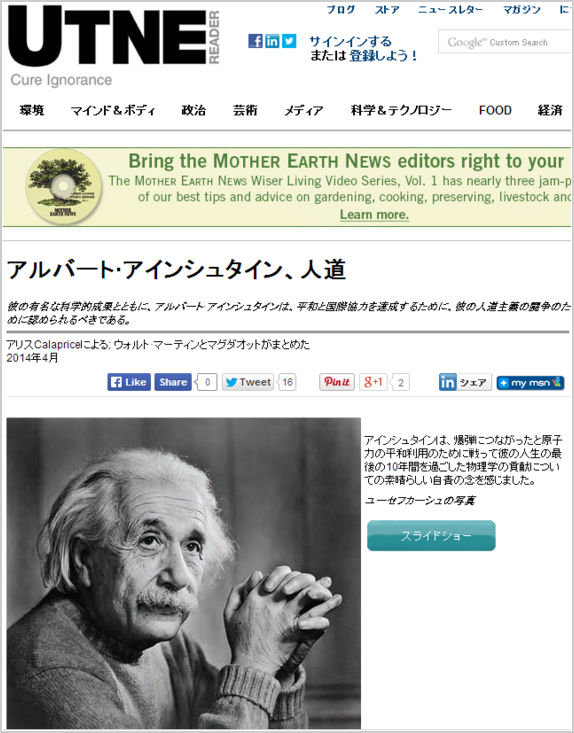
彼の有名な科学的成果とともに、アルバート·アインシュタインは、平和と国際協力を達成するために、彼の人道主義の闘争のために認められるべきである。
Along with his renowned scientific accomplishments, Albert Einstein should be acknowledged for his humanitarian struggles to achieve peace and international cooperation.
アリスCalapriceによる;ウォルト·マーティンとマグダオットがまとめました。2014年4月
By Alice Calaprice; compiled by Walt Martin and Magda Ott
April 2014
アインシュタインは、爆弾につながったと原子力の平和利用のために戦って彼の人生の最後の10年間を過ごした物理学の貢献についての偉大な自責の念を感じました。
Einstein felt great remorse about the contribution of physics that led to the bomb and spent the last ten years of his life fighting for the peaceful uses of atomic energy.
ユーセフカーシュの写真
Photo by Yousuf Karsh
アルバート·アインシュタインは、すべての時間の中で最も影響力のある科学者の一人だったが、彼はまた、人生の意味、自由意志と存在の本質と、彼は非常に密接に研究し、宇宙での私たちの場所について多くの感動的な考えを持っていた好奇心旺盛な哲学者だった。
Albert Einstein was one of the most influential scientists of all time, but he was also an inquisitive philosopher who had many inspiring thoughts about the meaning of life, the nature of free will and existence and our place in the cosmos he studied so closely.
ウォルト·マーティンとマグダOTTによってアルベルト·アインシュタイン(スターリング出版、2013年)の宇宙を見るには、1ボリュームにアインシュタインの最も感動的な宇宙の発話をコンパイルします。次の抜粋は、アリスCalaprice、プリンストン大学出版の元上級編集者序文からのものである。
The Cosmic View of Albert Einstein (Sterling Publishing, 2013) by Walt Martin and Magda Ott compiles Einstein’s most inspirational cosmic utterances into one volume. The following excerpt is from the foreword by Alice Calaprice, former senior editor of Princeton University Press.
アルバート·アインシュタイン、物理学者の中で超新星は、最高の彼はいわゆる天才、平和主義、そして、晩年、人道および政治活動で知られています。彼の業績は、私たちの間で最も熟練した赤面するのに十分、多種多様であるにもかかわらず、彼はしばしば途中でミスを頼りなさそうと作り、私たちの残りの部分のような生活を通じて自分の道を作り、実際には控えめで謙虚な人間だった。
Albert Einstein, the supernova among physicists, is best known for his so-called genius, pacifism, and, in his later years, humanitarian and political activism. Though his achievements are manifold, enough to make the most accomplished among us blush, he was in fact a modest and humble human being, making his way through life like the rest of us, often bumbling and making mistakes along the way.
彼は物理学と彼の世界観の両方で、しかし、状況及び決まる時間の経過として、彼の心を変更するのに十分な賢明だった。知恵、知性、技術、芸術の適切な並置では、アインシュタインの最も記憶に残る言葉と写真NASAが、世界中の他の天文台、アマチュア天文学者の編集者のコンパイルは鮮やかに私たちがダイナミックな宇宙の拡大との美しさをキャプチャします。 「世界の永遠の謎は、そのわかりやすさです。
He was, however, wise enough to change his mind as circumstances and the passage of time dictated, both in his physics and in his worldview. In an appropriate juxtaposition of wisdom, intellect, technology, and art, the editors’ compilation of Einstein’s most memorable words and photographs by NASA, other observatories around the world, and amateur astronomers vividly captures the beauties of our expanding and dynamic Universe. “The eternal mystery of the world is its comprehensibility.
それが分かりやすいということは奇跡です」とアインシュタインは1936年にこれらの写真を沈みながら、それら-芸術家の背後にある科学者や技術者の仕事は、我々の宇宙呼び出す奇跡的に変更するキャンバスを理解する人類の欲望の証オールである。
The fact that it is comprehensible is a miracle,” Einstein mused in 1936. These photos and the work of the scientists and technical experts behind them—artists all—are proof of humankind’s desire to comprehend the miraculously changing canvas we call our cosmos.
アインシュタインの「宇宙宗教」
Einstein’s “Cosmic Religion”
この本の中での写真の支配的な影響は、驚きと畏敬の念、アインシュタインは彼の力を信じ、自然の法則を定義する彼の試みで使用されている単語を鼓舞することです。これは彼が彼の "宇宙の宗教」と呼ばれる。私は "宇宙"宗教の彼の職業は、アインシュタインが最も可能性が高いそれは宗教的、ということが可能であることを伝えるためのものと言ってあえてではなく "個人"神への信仰、無神論者、なしで、世界全体でほとんどの社会"本物"の神として参照してください。
The dominant effect of the photos in this book is to inspire wonder and awe, words Einstein used in his attempt to define his faith in the power and laws of Nature. This he called his “cosmic religion.” . I venture to say that by his profession of a “cosmic” religion, Einstein most likely meant to convey that it is possible to be religious—that is, not an atheist—without belief in the “personal” God that most societies throughout the world see as the “real” God.
宗教のアインシュタインの考えは、指示される教義によって作ら規定し、自称専門家や絶対的な信者数百万歳にわたってrefashionedのではなく、に基づいており、より一定のテーマ、つまり、自然と彼女のほとんど揺るぎない、調和のとれた法律。 ···
Einstein’s idea of religion, rather than fashioned by dogma dictated, prescribed, and refashioned over the ages by millions of self-appointed experts and unquestioning believers, is based on a more constant theme—that of nature and her almost unwavering, harmonious laws. ...
「私はしない運命と人類の所業で自分に関係する神の世界の合法的な調和、彼自身を明らかにスピノザの神、を信じている。 」このように、アインシュタインは科学と宗教を統一し、自分自身と呼ばれていました「信心深い信じない人は、 「また、彼の世界観におけるオープンマインドと包括され、彼は預言者と同等に説得力のある、イエス、ブッダ、モーセを発見したとして。
“I believe in Spinoza’s God, who reveals himself in the lawful harmony of the world, not in a God who concerns himself with the fate and the doings of mankind.” In this way, Einstein was unifying science and religion, and referred to himself as a “deeply religious nonbeliever.” Moreover, being open-minded and inclusive in his worldview, he found Jesus, Buddha, and Moses equally compelling as prophets.
アインシュタインは彼が彼の神と呼ばれるように「古い」は、ビッグバンの太古の時代以来、運動の順番のほぼ完璧なシステムを設定していたことを驚きと畏敬の念を抱いていた。このシステムは、物理的な変化の長い年月を通じて辛抱、および、少なくとも、生物学的変換と進化によって、地球の場合はしています。
Einstein was in wonder and awe that “the Old One,” as he referred to his God, had set an almost perfect system of order in motion since the earliest times of the big bang. This system has persevered through eons of physical changes, and, in the case of Earth at least, through biological transformations and evolution.
自然のこれらの鉄則を通じ、宇宙は現在まで存続することができました。最近では、人類、多くの場合、その天然資源の搾取を通して、多くの場合、人々の利益ではなく、地球に害をもたらし、進歩の名の下に自然法則を改ざんすることができました。今日の世界では、アインシュタインは確かに世界の一部の地域において過度に熱心な消費者の一部にいくつかの犠牲を通して、確かに可能であるが、バランスのため発言だろう。
Through these immutable laws of nature, the universe has been able to survive to the present day. In more recent times, humankind, often through the exploitation of its natural resources, has been able to tamper with natural laws in the name of progress, often resulting in benefit to people but in harm to the planet. In today’s world, Einstein would surely speak out for a balance that, through some sacrifice on the part of overly zealous consumers in some parts of the world, is surely possible.
平和主義、科学者の社会的責任、および世界政府
Pacifism, Social Responsibility of the Scientist, and World Government
アインシュタインはアドルフ·ヒトラーが彼の長年の信念を妥協するために彼を強制的に第二次世界大戦の時代、中を除いて生涯平和主義だった。 「私の平和主義は、本能的な感覚は、人々の殺害は嫌なので、私を持っている感じです」と彼は1929年に書いた。 「私の態度が知的理論から導かれるものではなく、残酷さのあらゆる種類の私の最も深い反感をベースとしている憎悪"。......
Einstein was a lifelong pacifist except during the World War II era, when Adolf Hitler forced him to compromise his long-held beliefs. “My pacifism is an instinctive feeling, a feeling that possesses me because the murder of people is disgusting,” he wrote in 1929. “My attitude is not derived from any intellectual theory but is based on my deepest antipathy to every kind of cruelty and hatred.” ….
彼はまた、多くの場合、平和目的ではなく、戦争のための新たな発見を最大限に利用する、作る科学者と政策決定者の責任について話したし、すべての人類の利益のために。 1948年8月に、 3年、第二次世界大戦の終了後や不確実な新しい原子力時代に、彼は仲間の知識人へのメッセージを発表した。
He also often spoke of the responsibility of scientists and policy makers to make the best use of new discoveries, for peaceful purposes rather than war, and for the benefit of all humankind. In August 1948, three years after the end of World War II and in an uncertain new atomic age, he released a message to fellow intellectuals:
「我々が悲劇的な目的地の消滅、より陰惨な、より効果的な方法を作るのを助けるためにしている科学者は、 、のための残忍な目的のために使用されているから、これらの武器を防止するのに我々の力ですべてを行うには、それ私たちの厳粛なと超越的義務考慮しなければなりませんそれらが発明された。どのようなタスクは、おそらく我々にとってより重要だろうか? "
“We scientists, whose tragic destination has been to help in making the methods of annihilation more gruesome and more effective, must consider it our solemn and transcendent duty to do all in our power in preventing these weapons from being used for the brutal purpose for which they were invented. What task could possibly be more important for us?”
アインシュタインは、爆弾につながったと原子力の平和利用のために戦って彼の人生の最後の10年間を過ごした物理学の貢献についての偉大な後悔を感じた....
Einstein felt great remorse about the contribution of physics that led to the bomb and spent the last ten years of his life fighting for the peaceful uses of atomic energy….
彼は、ラッセル·アインシュタイン宣言、 21世紀の関連性の高いまま、20世紀の最も重要な文書の1と呼ばれるようになった非科学的な文に彼の最後の署名を追加しました。
He appended his last signature to a nonscientific statement that came to be called the Russell-Einstein Manifesto, one of the most important documents of the twentieth century which remains highly relevant in the twenty-first century.
これは、正式には3ヶ月の哲学者、平和活動家バートランド·ラッセル彼の死の後に発行されました。この文書では、 「軍備の一般的削減の一環として、核兵器を放棄する「すべての国民への呼び出しだった9他の著名な科学者によって署名された。
It was formally issued three months after his death by philosopher and peace activist Bertrand Russell. This document was a call to all nations “to renounce nuclear weapons as part of a general reduction of armaments” and was signed by nine other prominent scientists.
今日では、アインシュタインは失敗した人道主義闘争は平和、世界秩序、国際協力を達成する場合には、彼の揺るぎないため表彰され続けて、マッカーシズム、人種差別、民族差別、そして世界中で人権の彼のサポートへの彼の情熱的な反対のため。
Today, Einstein continues to be honored for his unwavering if unsuccessful humanitarian struggles to achieve peace, world order, and international cooperation, and for his passionate opposition to McCarthyism, racial segregation, ethnic discrimination, and his support of human rights throughout the world.
読者が閲覧またはフォロー壮大な写真作品を点検し、彼らは畏敬の念で満たされることは確実であり、彼は自然を企図するとき、自分の宗教的信念は彼と異なる場合アインシュタインは、どんなにを感じたことだろうか。私たちは球の音楽の小さなノートですが、それを参照してくださいように、全ての地球人は、保護するために、ここで、地球上の1人として一緒に来て保存し、そして私たちの物理的な空間だけでなく、私たちの仲間の生き物を崇拝するための努力を倍加する必要があります。
As readers peruse or inspect the spectacular photographic creations that follow, they are certain to be filled with the awe and wonder that Einstein felt when he contemplated nature, no matter if their own religious beliefs are different from his. As we see that we are but a tiny note in the music of the spheres, all Earthlings should redouble their efforts to come together as one people on Earth, here to protect, preserve, and revere our physical space as well as our fellow creatures.
アルバート·アインシュタインと人類の状態:アルベルト·アインシュタインの宇宙を見るから続きを読む。
Read more from The Cosmic View of Albert Einstein: Albert Einstein and the State of Humanity.
-
アルバート·アインシュタインと人類の現状
Albert Einstein and the State of Humanity
編集者からのより多くの場合は、ライターの音声ラジオのインタビューをチェックアウト。
For more from the editors, check out the Writer's Voice radio interview.
-
作家の声 - 20131201 - ウォルト·マーティンとマグダオット
Writer's Voice - 20131201- Walt Martin and Magda Ott
アリスCalapriceはアルバート·アインシュタインに著名な専門家であり、プリンストン大学出版の長年の上級編集者だった。彼女は、プロジェクトの設立以来、アルバート·アインシュタインの論文集と協力して原稿整理し、すべてのボリュームの生産を監督し、国立科学財団からの助成金添付の翻訳シリーズを投与。
Alice Calaprice is a renowned expert on Albert Einstein and was a longtime senior editor at Princeton University Press. She has worked with the Collected Papers of Albert Einstein since the founding of the project, has copyedited and overseen the production of all the volumes, and administered the accompanying translation series with a grant from the National Science Foundation.
彼女はアインシュタインに関するいくつかの一般的な書籍の著者であり、学術的な編集の個々の達成のための文学マーケットプレイスの賞を受賞した。
She is the author of several popular books on Einstein and was a recipient of the Literary Market Place's award for individual achievement in scholarly editing.
アリスCalapriceはアルバート·アインシュタインに著名な専門家であり、プリンストン大学出版の長年の上級編集者だった。彼女は、プロジェクトの設立以来、アルバート·アインシュタインの論文集と協力して原稿整理し、すべてのボリュームの生産を監督し、国立科学財団からの助成金添付の翻訳シリーズを投与。彼女はアインシュタインに関するいくつかの一般的な書籍の著者であり、学術的な編集の個々の達成のための文学マーケットプレイスの賞を受賞した。
Alice Calaprice is a renowned expert on Albert Einstein and was a longtime senior editor at Princeton University Press. She has worked with the Collected Papers of Albert Einstein since the founding of the project, has copyedited and overseen the production of all the volumes, and administered the accompanying translation series with a grant from the National Science Foundation. She is the author of several popular books on Einstein and was a recipient of the Literary Market Place's award for individual achievement in scholarly editing.
アルバート·アインシュタイン©ウォルター·マーティンとマグダオット、スターリングエトス、ユーセフカーシュによるスターリング出版(株)写真のインプリントによる2013年の宇宙を見るから許可を得て転載。 NASA/ ESA、ジェフ·ヘスターとポールScowen(アリゾナ州立大学);とゲイリースティーブンス。
Reprinted with permission from The Cosmic View of Albert Einstein © 2013 by Walter Martin and Magda Ott, Sterling Ethos, an imprint of Sterling Publishing Co., Inc. Photography by Yousuf Karsh; NASA/ESA, Jeff Hester and Paul Scowen (Arizona State University); and Gary Stevens.
記事サイト / Article site
アルバート·アインシュタインの宇宙を見る: 芸術、科学、平和に関する文章
The Cosmic View of Albert Einstein:Writings on Art, Science, and Peace
グーグルで記事を読む
Trained Fleas !
Newfield News ArticleHuman Beings and...Trained Fleas?By Patricia Hirsch, NCOC®, MCC, MBA
http://www.newfieldnetwork.com/New2/News/0411/Fleas/index.cfm?pid=NN0411